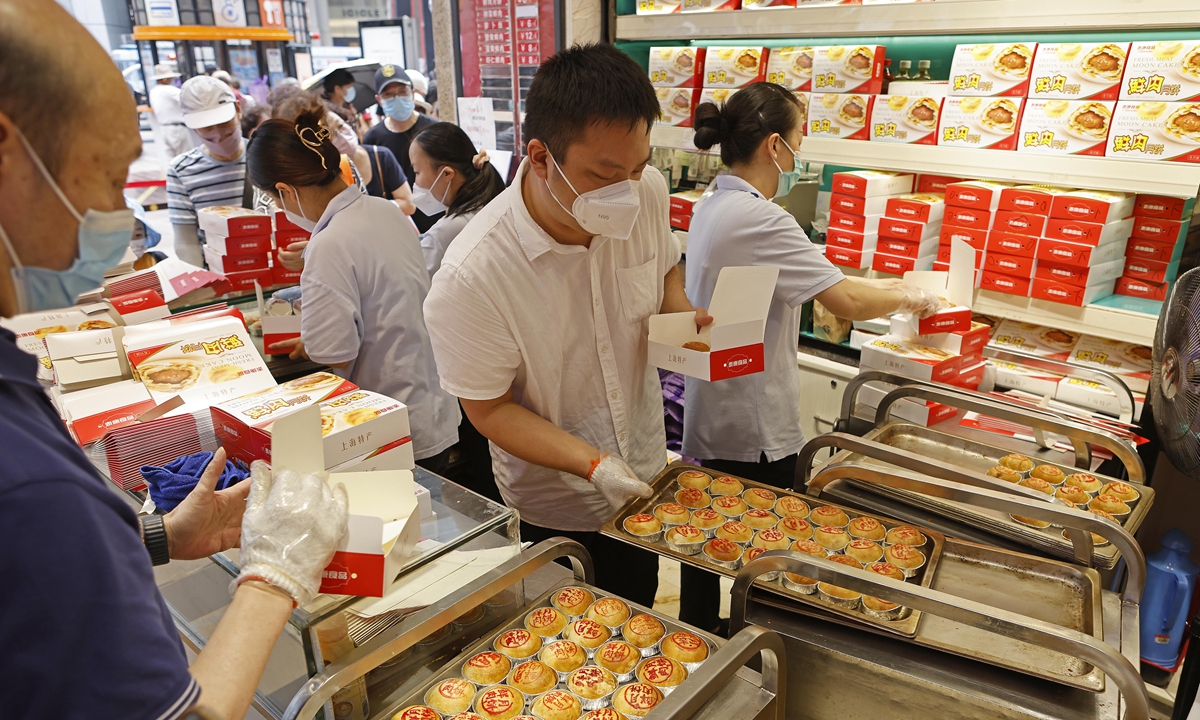
Staff pack fresh meat-filled mooncakes into boxes at a shop in Shanghai on September 6, 2022. The Mid-Autumn Festival falls on September 10 this year. It is a traditional festival usually marked by family reunions, full moon viewing and the consumption of mooncakes. Photo: VCG
Chinese health officials on Thursday encouraged the public to stay put or reduce out-of-town trips during what's normally known as a golden period of tourism in the country. However, the anti-COVID-19 moves have not dampened consumers' enthusiasm for the holidays, as bookings for local tourism soared.
The Mid-Autumn Festival holiday, which will start on Saturday, and the National Day holiday in early October are traditional peak season for travel. Though inter-provincial travel has been affected, spending during the holidays will show reliance given a wide range of options and consumption recovery will continue once the epidemic is reined in, analysts noted.
At a news conference on Thursday, Wu Liangyou, an official at the National Health Commission, said that to prevent large-scale outbreaks during the holidays, China will firmly stick to the dynamic zero-COVID strategy.
Wu outlined several antivirus measures for the holidays, including encouraging people to stay put or reduce out-of-town trips and requirements for tests and health code checks. The measures will be implemented through the end of October.
Before Thursday's measures, many Chinese localities, including Shanghai, North China's Tianjin and Nanjing in East China's Jiangsu Province, have encouraged residents to stay put for the holiday and not leave the city unless necessary.
Under the anti-COVID-19 measures for the holidays, Chinese transport authorities said on Thursday that 24 million passenger trips are expected to be made daily during China's Mid-Autumn Festival holiday down 32 percent from 2020 and 53 percent from 2019.
However, the measures have also boosted excursions within these cities and nearby areas, with bookings for high-end hotels, homestays and camping activities among the fastest-growing parts of the industry, Xu Xiaolei, marketing manager at China's CYTS Tours, told the Global Times on Thursday.
A Mid-Autumn Festival forecast from Trip.com showed that in the past week, bookings for trips within provinces increased by 267 percent from the previous week and the per capita consumption of high-star hotels over the Mid-Autumn Festival has achieved double-digit growth year-on-year.
Driven by the demand for short trips, bookings for camping-related products increased more than sevenfold for China's online travel agency Fliggy, compared with the previous week. Enjoying nature and camping are becoming popular options during the festival. Orders for rural homestays during the Mid-Autumn Festival on the platform jumped 1.8 times from the previous week.
Many cities and provinces have accelerated issues of consumption coupons to boost local spending during the two holidays, which represent the consumption peak for the second half of the year.
Central China's Hubei Province will issue the second and third rounds of consumption vouchers in September and October, the Xinhua News Agency reported. On September 6, the province issued 13 million vouchers worth 395 million yuan, which can be used in malls, supermarkets and catering outlets.
In Shanghai, a total of 1 billion yuan in e-coupons will be issued in three installments between late August and late November. The second batch of 500 million yuan will be issued in late September and the third batch of 300 million yuan is expected to follow.
These big coupon issues will have a great driving impact on consumption, Tian Yun, a Beijing-based economist, told the Global Times.
"In particular, purchases of new-energy vehicles will have a very strong potential to boost consumption, which can be maximized by the effect of coupons," Tian said.
For example, Zhengzhou, Central China's Henan Province, has issued 100 million yuan worth of vouchers for car purchases.
"Consumption during the two festivals accounts for about 4 percent of retail sales for the year. Due to the impact of the epidemic, inter-provincial mobility may be somewhat inhibited, but local spending is expected to provide offsetting benefits," Tian said.
Holiday spending is an important window into consumer expectations, and so far the fundamentals of China's consumer confidence have not been hurt, Cao Heping, an economist at Peking University, told the Global Times on Thursday. "It is expected that the spending during the two holidays will be on par with that of last year," Cao said.
Chinese consumers have learned to adapt to sporadic outbreaks and the government has been taking a more precise approach to epidemic prevention and control.
Cong Yi, professor of the Tianjin University of Finance and Economics, told the Global Times on Thursday that China's dynamic zero-COVID policy and precise epidemic prevention aims to quickly detect and curb infections so as to bring any outbreak under control in the shortest time.
"As soon as the pandemic is put under control the market will recover and rebound quickly," Cong said.




